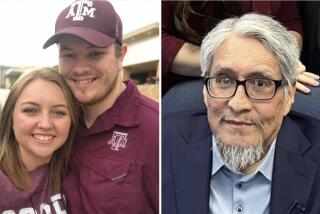Murder Suspect Claims He Cannot Recall Confessing
- Share via
SANTA BARBARA — Ryan Hoyt, on trial for the kidnapping and murder of a 15-year-old West Hills boy, testified Friday that he suffered from amnesia for several days after he was arrested and could not remember confessing to detectives.
“I don’t recall the interview at all,” he told jurors in Santa Barbara County Superior Court. The videotaped interrogation, played in court earlier this week, showed Hoyt admitting he had killed Nicholas Markowitz--a claim he now denies.
Under cross-examination by Santa Barbara County Deputy Dist. Atty. Ron Zonen, Hoyt said he had never before experienced memory loss, except during a drinking binge. On occasion, he suffered “alcoholic blackouts,” after which he had no recollection of being drunk. He also said he had been using cocaine and marijuana for several years.
“Prior to my arrest, I was partying so hard I don’t believe I slept at all” for about a week, Hoyt testified. “I was drinking, snorting coke, smoking weed.”
The defendant, who faces the death penalty if convicted, is one of five young men charged with the Aug. 8, 2000, killing, and the first to stand trial. Prosecutors allege that Hoyt, 22, and two others took Markowitz into the hills of Santa Barbara and that Hoyt shot him nine times at close range.
Hoyt and three others were arrested a week later. They are Jesse Rugge, 21, of Santa Barbara, William Skidmore, 21, of Simi Valley and Graham Pressley, 18, of Goleta. All have pleaded not guilty. The fifth suspect, 21-year-old Jesse Hollywood of West Hills, has not been caught.
Hoyt maintains that his only role in Markowitz’s death was unintentional. He has testified that he gave Rugge a duffel bag on the night of the murder, believing it contained marijuana. Days later, Hoyt said, he realized it had held the machine gun used to kill Nicholas.
Hoyt’s claims of false confession and amnesia were debated Friday by a trio of expert witnesses, all psychologists or psychiatrists who had assessed him. All three agreed that Hoyt showed no signs of serious mental illness but said he has a personality disorder characterized by “avoidant” and “dependent” behavior.
“He’s a man who’s never really succeeded at anything,” said Michael Kania, a clinical and forensic psychologist hired by the defense.
Hoyt had trouble keeping a job or finding a girlfriend, Kania said. He struggled with untreated depression, abused drugs and relied on others to support him.
Kania testified that people who confess to crimes they did not commit may have low self-confidence and high anxiety. They tend to trust authority, try to be helpful or seek to protect others. Hoyt, he concluded, fits the profile.
As for amnesia, Kania conceded that the complete memory loss Hoyt described was “very unusual.” But he said it could have resulted from the emotional trauma of being arrested and questioned.
David Glaser, a forensic psychiatrist for the prosecution, said he believed Hoyt was simply lying. Amnesia is usually “not absolute,” meaning that people often recall snippets of past events when prompted with verbal or written cues.
But when Glaser interviewed Hoyt, the defendant insisted that he remembered nothing at all about his confession to detectives.
“The answer lies in his history,” Glaser testified. “There’s been no evidence that he has ever had [memory loss] other than when he was extremely stoned, and that would be expected.”
During a three-hour psychiatric examination he conducted Tuesday, Glaser said he found Hoyt had clear recall of other events.
“His memory was crisp. It was solid,” he said. “But then there’s that blank two-day period. That’s simply not consistent with how the brain works.”
Phony amnesia, he added, is “fairly common” in murder cases.
More to Read
Sign up for Essential California
The most important California stories and recommendations in your inbox every morning.
You may occasionally receive promotional content from the Los Angeles Times.












